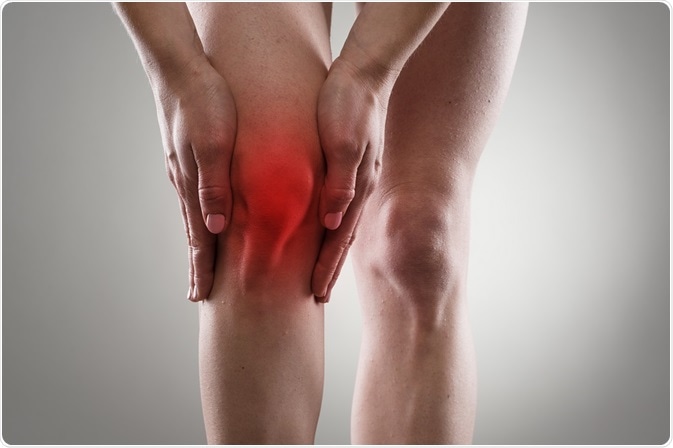Gout is an arthritic condition caused by the deposition of crystals composed of monosodium urate in and around the joints, accompanied by severe and repeated bouts of pain and inflammation.
 Credit: Statisque/Shutterstock.com
Credit: Statisque/Shutterstock.com
One of the major risk factors for gout is hyperuricemia or high blood uric acid levels. Uric acid is the end product of purine breakdown, and purines are obtained primarily from red meat.
High uric acid levels and gout also act as biomarkers for cardiovascular risk. Researchers have therefore focused on the relationship between various dietary components such as meat, alcohol, seafood, coffee, dairy products, folate and gout.
Fructose is a simple monosaccharide sugar and is usually found in fruits, by itself or as part of sucrose. It is also currently found to varying amounts in high-fructose corn syrup (HFCS), which is a modified form of corn sucrose syrup. Being a liquid sugar and inexpensive to produce, it is widely used in developed countries.
Many epidemiologists have pointed out the temporal association between the increase in the use of HCFS and total percentage of fructose in the diet, with the increased prevalence of gout and hyperuricemia. A major meta-analysis found that most observational studies support the role of high fructose consumption as a risk marker for the occurrence of gout.
The most common source of fructose was sugar-sweetened beverages, which usually use HFCS as the sweetener. Men have a higher incidence of gout, which may lead to a falsely low effect size in many studies which include only women, despite a matched intake of fructose in both genders. Female hormones may promote uric acid excretion and protect against gout in various ways as yet not fully understood.
How does increased fructose intake lead to gout?
Fructose is taken up by the liver following absorption and converted to fructose-1-phosphate, which causes a reduction in ATP levels. The resulting increase in AMP means it is converted to IMP instead, in the absence of phosphate for phosphorylation. This in turn can enter the uric acid synthetic pathway. Increasing fructose intake and lowered ATP levels may lead to an increase in purine nucleotide production with increased uric acid being a side effect.
Another possible pathway is reduced insulin sensitivity due to the peripheral fat deposition induced by fructose, which may result in reduced uric acid excretion.
Experiments involving the administration of fructose orally or intravenously have shown that it is followed by a quick rise in uric acid levels in the blood as purines are broken down and more purines are synthesized. This rise was even higher in people who already had hyperuricemia or gout. Those individuals who had 2 or more sugar-sweetened beverages a day had an 85% higher risk of gout than those who had less than one serving a month, while the risk was 45% higher with one serving a day.
These associations were found to be constant irrespective of alcohol use, body mass index, age, blood pressure or the presence of kidney disease. It is also found that fructose-rich fruits and vegetables also raise the risk of gout in susceptible individuals. Thus such subjects might be advised to cut down on sweet fruits and beverages, while vegetables and fructose-poor fruits should be continued to ensure their benefits in reducing the risk of chronic cardiovascular disease, malignancy and age-related eye disease.
The SLC2A9 allele protects its possessors against gout by increasing the renal uric acid excretion. However, high levels of sugar intake lead to negation of its protective effects and the onset of hyperuricemia, with each serving of sugar-sweetened beverage increasing gout risk by 15% in allele-positive subjects.
Guidelines and outlook
In short, a high daily consumption of sugar-sweetened beverages is associated with gout, obesity, and other metabolic syndromes. One can of such a drink has about 32g added sugar while AHA guidelines advise only 20g and 36g added sugar per day for women and men respectively.
It is wise for people with a history of gout to replace sugary drinks with water or at least with diet drinks to reduce gout attack frequency, while those at risk of gout would also do well to avoid consuming such drinks more than once or twice a month.
Further Reading
Last Updated: Feb 26, 2019